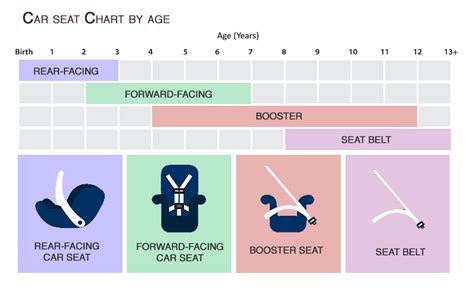Front Seat vs. Back Seat in Virginia: The Age Factor
Virginia, like many states, has laws dictating where passengers of different ages can sit in a vehicle. Understanding these regulations is crucial for driver safety and legal compliance. This article clarifies Virginia's laws regarding front seat vs. back seat passenger placement based on age, addressing common questions and misconceptions.
What is the Minimum Age for Front Seat Passengers in Virginia?
There isn't a specific minimum age for front seat passengers in Virginia. The law focuses on weight and height requirements for children in car seats or booster seats, not a blanket age restriction for the front seat. This means a 10-year-old could legally sit in the front, but only if they meet certain criteria related to their size and car seat usage.
What are the Car Seat and Booster Seat Laws in Virginia?
Virginia's law mandates car seats and booster seats for children based on weight and height, not solely age. Understanding these requirements is vital for determining the appropriate seating position:
-
Rear-Facing Car Seats: Children must use a rear-facing car seat until they reach the weight or height limit specified by the car seat manufacturer. This is generally considered the safest position for infants and toddlers.
-
Forward-Facing Car Seats: Once a child outgrows their rear-facing car seat, they must use a forward-facing car seat until they reach the weight or height limit specified by the manufacturer.
-
Booster Seats: After a child outgrows their forward-facing car seat, they must use a booster seat until they are tall enough to wear an adult seat belt properly. This generally means that their knees bend at the edge of the seat, and the seat belt crosses their chest and upper thighs without pinching or riding up.
Why Are Younger Children Required to Sit in the Back Seat?
While there's no specific Virginia law mandating younger children in the back, the emphasis on car seats and booster seats inherently places them in the back. This is primarily due to safety. The back seat offers increased protection in a collision due to the crumple zones of the vehicle. In a front-end collision, a child unrestrained or improperly restrained in the front seat is at significantly greater risk of serious injury or death.
Can Teenagers Ride in the Front Seat in Virginia?
Yes, teenagers can legally ride in the front seat in Virginia, provided they are properly restrained with a seat belt. However, many parents and driving instructors still advise against it until the teen demonstrates a high level of maturity and driving skill.
What About Airbags?
Airbags, while designed to protect adults, can be dangerous for small children. The force of an airbag deploying can cause severe injuries, even death, to a child sitting in the front seat. Therefore, keeping children in the back seat, properly restrained in appropriate car seats or booster seats, reduces the risk of airbag-related injuries.
Are there Exceptions to the Car Seat Laws?
Exceptions might exist for medical reasons. If a child has a medical condition that prevents them from safely using a car seat or booster seat, a physician's note may be required. Always consult with your pediatrician or a medical professional for advice on specific situations.
Penalties for Non-Compliance
Failing to comply with Virginia's child passenger safety laws can result in fines and other penalties. The severity of the penalties can vary depending on the specific violation.
In conclusion, while Virginia doesn't have a specific minimum age for front-seat passengers, the emphasis on child car seat and booster seat laws effectively keeps young children in the back seat for their safety. Parents and drivers should prioritize the safe transportation of children by adhering to these regulations and understanding the reasoning behind them. Always consult your pediatrician and the car seat manufacturer's instructions for the best and safest way to transport children in your vehicle.

